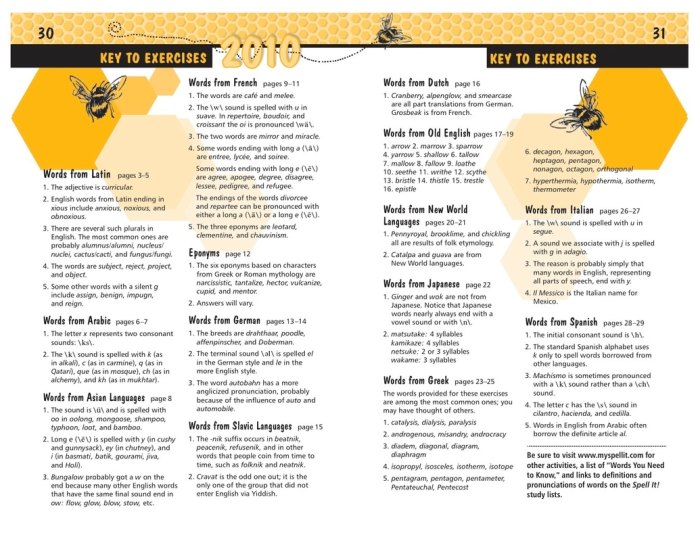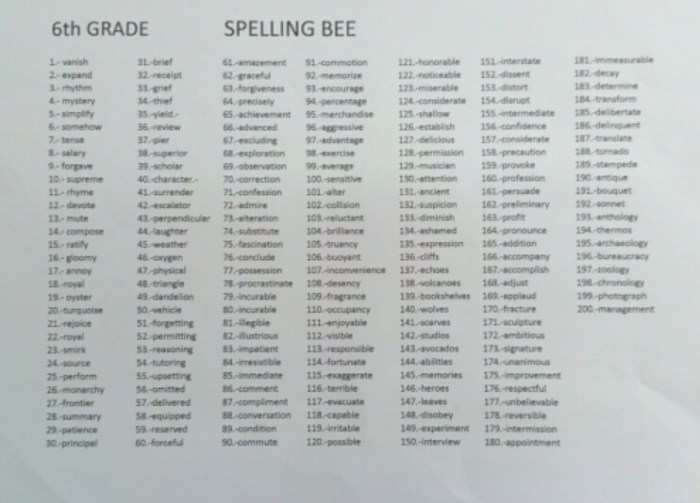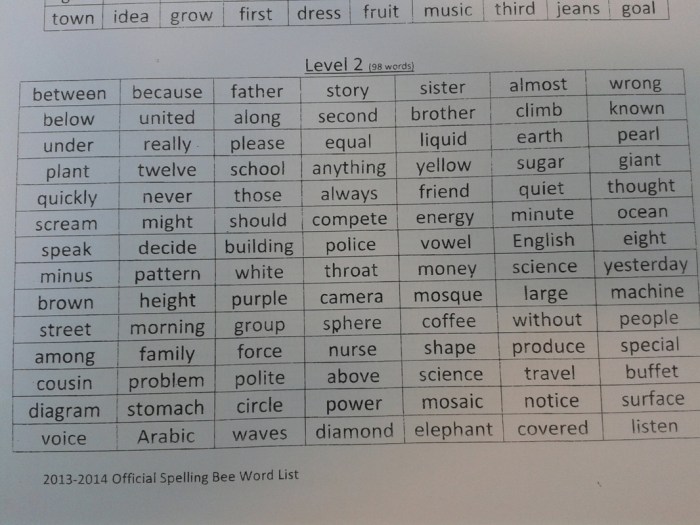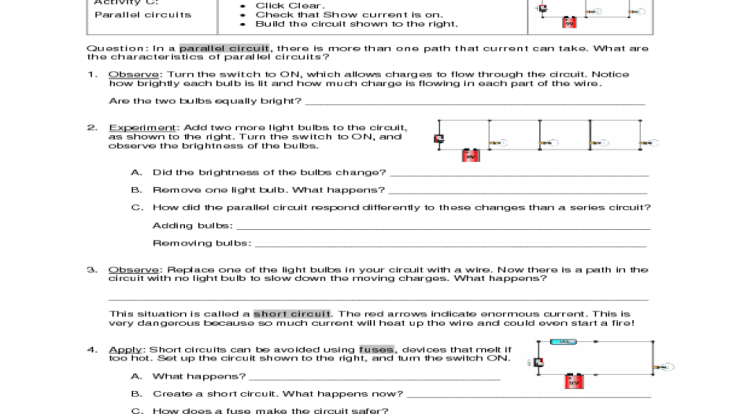Embark on an exciting journey into the world of words with the Spelling Bee for 9th Graders. This educational endeavor not only tests your spelling prowess but also opens doors to academic and personal achievements.
Delve into the intricacies of spelling bee competitions, discover effective preparation strategies, and explore the myriad benefits that await participants. Join us as we navigate the fascinating world of spelling bees, where every word spelled correctly brings you closer to victory.
Introduction
Spelling bees are exciting competitions that test participants’ spelling skills. For 9th graders, these competitions offer an invaluable opportunity to enhance their vocabulary and sharpen their spelling abilities.
Spelling proficiency is crucial for academic and professional success. In an increasingly digital world, where written communication is essential, strong spelling skills ensure clear and effective communication. Mastering spelling also improves reading comprehension and overall language proficiency.
The 9th grade spelling bee is a great way to test your vocabulary and spelling skills. If you’re looking for some extra practice, check out this website for some helpful tips and tricks. With a little bit of preparation, you’ll be sure to impress the judges at your next spelling bee.
Structure and Format of a Spelling Bee
A spelling bee is an event where participants compete to spell words correctly. The structure and format of spelling bees can vary, but there are some common elements.
Typically, a spelling bee consists of several rounds. In each round, participants are given a word to spell. If they spell the word correctly, they advance to the next round. If they misspell the word, they are eliminated from the competition.
The difficulty of the words increases as the competition progresses. In the early rounds, participants may be given simple words to spell, such as “cat” or “dog.” As the competition progresses, the words become more difficult, such as “onomatopoeia” or “pneumonia.”
There are different formats for spelling bees. Some spelling bees are individual competitions, while others are team competitions. In individual competitions, each participant competes on their own. In team competitions, participants work together to spell words correctly.
Spelling bees can also be held online. Online spelling bees allow participants to compete from anywhere in the world. Participants can log in to a website or app and compete against other participants in real-time.
Individual Spelling Bees
Individual spelling bees are the most common type of spelling bee. In an individual spelling bee, each participant competes on their own. Participants are given a word to spell, and they must spell it correctly to advance to the next round.
Individual spelling bees can be held at schools, libraries, or other community centers. They can also be held online.
Team Spelling Bees
Team spelling bees are another common type of spelling bee. In a team spelling bee, participants work together to spell words correctly. Teams can be made up of two or more participants.
Team spelling bees can be held at schools, libraries, or other community centers. They can also be held online.
Online Spelling Bees
Online spelling bees allow participants to compete from anywhere in the world. Participants can log in to a website or app and compete against other participants in real-time.
Online spelling bees can be individual or team competitions. They can also be held at different levels, such as local, regional, or national.
Preparation Strategies for 9th Graders
Conquering a spelling bee requires strategic preparation. Let’s delve into effective techniques to enhance your vocabulary, master root words, and stay focused under pressure.
Vocabulary Building
- Immerse yourself in literature, newspapers, and online articles to encounter diverse words.
- Use flashcards or a notebook to record new words and their meanings.
- Engage in word games like Scrabble or crossword puzzles to expand your vocabulary.
Root Word Analysis
Understanding root words provides a foundation for spelling unfamiliar words.
- Study common prefixes and suffixes, such as “anti-” (against) and “-tion” (action).
- Break down words into their root components to grasp their meaning and spelling.
- Identify patterns in root words to improve your ability to spell related words.
Memorization Techniques
- Spaced repetition: Review words at increasing intervals to strengthen memory.
- Active recall: Try to spell words from memory without looking at notes.
- Visual association: Create mental images or stories to connect words with their spellings.
Managing Anxiety and Focus
- Practice relaxation techniques, such as deep breathing or meditation, to reduce stress.
- Visualize yourself succeeding to build confidence and reduce anxiety.
- Focus on one word at a time during the competition to avoid feeling overwhelmed.
Commonly Misspelled Words

In the realm of spelling bees, certain words seem to have a knack for tripping up even the most seasoned spellers. These are the commonly misspelled words that 9th graders should prioritize mastering.
To aid in your preparation, we’ve compiled a comprehensive list of these words, along with their correct spellings, definitions, and parts of speech.
Table of Commonly Misspelled Words
| Word | Correct Spelling | Definition | Part of Speech |
|---|---|---|---|
| accommodate | accommodate | to provide for the needs or comfort of | verb |
| acquaintance | acquaintance | a person you know slightly | noun |
| alleviate | alleviate | to make something less severe | verb |
| amateur | amateur | a person who engages in an activity as a hobby rather than professionally | noun |
| appreciate | appreciate | to be grateful for | verb |
| believe | believe | to have confidence in the truth or existence of something | verb |
| calendar | calendar | a system of organizing days for social, religious, commercial, or administrative purposes | noun |
| commitment | commitment | a pledge or promise | noun |
| conscience | conscience | the moral sense of right and wrong | noun |
| embarrass | embarrass | to cause to feel ashamed or self-conscious | verb |
| environment | environment | the surroundings in which a person, animal, or plant lives | noun |
| excellent | excellent | extremely good | adjective |
| exquisite | exquisite | extremely beautiful or delicate | adjective |
| familiar | familiar | well-known or acquainted with | adjective |
| guarantee | guarantee | a promise or assurance | noun |
| harass | harass | to annoy or bother repeatedly | verb |
| immediate | immediate | occurring or done at once | adjective |
| independent | independent | not relying on or controlled by others | adjective |
| indispensable | indispensable | absolutely necessary | adjective |
| interfere | interfere | to obstruct or hinder | verb |
| leisure | leisure | free time | noun |
| library | library | a collection of books, magazines, and other materials for reading | noun |
| millennium | millennium | a period of one thousand years | noun |
| necessary | necessary | needed | adjective |
| occurrence | occurrence | an event or incident | noun |
| opponent | opponent | a person who competes against another | noun |
| parallel | parallel | running side by side and never meeting | adjective |
| permanent | permanent | lasting or continuing indefinitely | adjective |
| persuade | persuade | to convince to do or believe something | verb |
| possession | possession | something owned | noun |
| preference | preference | a greater liking for one thing than another | noun |
| privilege | privilege | a special right or advantage | noun |
| proceed | proceed | to continue or go forward | verb |
| pronunciation | pronunciation | the way a word is spoken | noun |
| purpose | purpose | the reason for which something is done or made | noun |
| receipt | receipt | a written acknowledgement of payment or delivery | noun |
| recommend | recommend | to suggest or advise | verb |
| reference | reference | a person or thing that can be consulted for information | noun |
| relieve | relieve | to make less severe or painful | verb |
| separate | separate | to divide or keep apart | verb |
| sergeant | sergeant | a non-commissioned officer in the army or air force | noun |
| similar | similar | like or resembling | adjective |
| sincerely | sincerely | in a genuine and honest manner | adverb |
| specifically | specifically | in a precise or exact manner | adverb |
| stationary | stationary | not moving | adjective |
| succeed | succeed | to achieve or accomplish something | verb |
| sufficient | sufficient | adequate or enough | adjective |
| supersede | supersede | to take the place of | verb |
| surprise | surprise | an unexpected or astonishing event | noun |
| suspicious | suspicious | causing suspicion | adjective |
| sympathy | sympathy | a feeling of pity or compassion | noun |
| technique | technique | a method or skill | noun |
| temporary | temporary | lasting for a limited time | adjective |
| thorough | thorough | complete and detailed | adjective |
| tolerate | tolerate | to endure or put up with | verb |
| transparent | transparent | allowing light to pass through | adjective |
| unanimous | unanimous | agreed by all | adjective |
| uncomfortable | uncomfortable | causing discomfort | adjective |
| understand | understand | to have knowledge or comprehension of | verb |
| unfortunately | unfortunately | regrettably | adverb |
| unnecessary | unnecessary | not needed | adjective |
| usually | usually | customarily or habitually | adverb |
| vacate | vacate | to leave a place empty | verb |
| valuable | valuable | having great worth or importance | adjective |
| variety | variety | a number or range of different things | noun |
| vicinity | vicinity | the area near a particular place | noun |
| villain | villain | a wicked or evil person | noun |
| weird | weird | strange or unusual | adjective |
| wherefore | wherefore | the reason for which | adverb |
| whether | whether | used to introduce a choice between two or more alternatives | conjunction |
| yacht | yacht | a large, luxurious boat used for pleasure | noun |
Spelling Bee Rules and Etiquette

Spelling bees are not just about memorizing words; they also involve understanding the rules and regulations that govern the competition. These rules ensure fairness and maintain the integrity of the event.
When it comes to etiquette, participants are expected to demonstrate sportsmanship and respect for their fellow competitors. This includes being gracious in victory and defeat, as well as avoiding any disruptive or unsportsmanlike behavior.
Pronunciation and Definitions
- The pronouncer clearly states the word and its part of speech.
- Participants may request the word to be repeated, pronounced slowly, or defined.
- The pronouncer’s pronunciation is final.
Challenges
- Participants may challenge the pronouncer’s pronunciation or definition of a word.
- Challenges must be made immediately after the word is given.
- The judges will rule on the challenge and their decision is final.
Sportsmanship and Respect
- Participants should be respectful of the pronouncer, judges, and fellow competitors.
- Avoid interrupting others, making distracting noises, or engaging in any behavior that could disrupt the competition.
- Congratulate the winner and thank the organizers for hosting the event.
Benefits of Participating in a Spelling Bee
Participating in a spelling bee offers numerous advantages for 9th graders, extending beyond mere memorization of words. It fosters academic, social, and personal growth, contributing to a well-rounded educational experience.
Academic Benefits
Spelling bees enhance vocabulary development, exposing students to a vast array of words, including those commonly encountered in literature, science, and history. By studying the etymology and definitions of these words, students expand their knowledge base and improve their comprehension skills.
Moreover, the rigorous practice involved in preparing for a spelling bee sharpens memory and strengthens cognitive abilities, including attention span and focus.
Social Benefits, Spelling bee for 9th graders
Spelling bees provide a unique platform for students to interact with peers who share their passion for language. They learn the importance of collaboration and teamwork, as they often form study groups or exchange tips with other participants. The competitive nature of the event also encourages students to develop healthy rivalries and strive for excellence.
Personal Benefits
Participation in a spelling bee boosts confidence and self-esteem. Students who successfully navigate the challenges of the competition gain a sense of accomplishment and pride in their abilities. They learn to persevere in the face of setbacks and develop a positive attitude towards learning.
Additionally, spelling bees can inspire students to pursue further studies in linguistics, literature, or other language-related fields.
Historical and Cultural Significance of Spelling Bees: Spelling Bee For 9th Graders

Spelling bees have a rich history dating back to the 19th century in the United States. They gained popularity as a form of entertainment and education, fostering literacy and linguistic skills. Spelling bees became a cultural phenomenon, captivating audiences with the suspense and intellectual challenge they presented.
Notable Spelling Bee Winners and Their Achievements
Over the years, numerous talented spellers have emerged as winners of prestigious spelling bees. Some notable achievements include:
- Frank Neuhauser: Won the National Spelling Bee in 1975, setting a record for the most consecutive wins (five) and becoming the first speller to win using the dictionary definition.
- Nupur Lala: Became the youngest winner of the Scripps National Spelling Bee in 1999 at the age of 10.
- Zaila Avant-garde: Won the Scripps National Spelling Bee in 2021, making history as the first African American female to win the competition.
Expert Answers
What is the format of a spelling bee?
Spelling bees typically consist of multiple rounds, with each round increasing in difficulty. Participants are given a word to spell, and they must pronounce it correctly and spell it out loud without errors.
How can I prepare for a spelling bee?
Effective preparation involves studying vocabulary lists, understanding root words, and practicing spelling regularly. Additionally, managing anxiety and maintaining focus during the competition are crucial.
What are the benefits of participating in a spelling bee?
Spelling bees offer academic benefits such as vocabulary expansion and improved spelling skills. They also foster social skills, boost confidence, and enhance critical thinking abilities.
